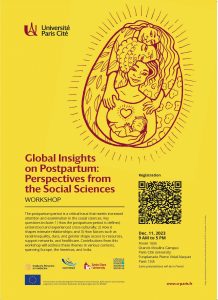In the 1970s, anthropologist Dana Raphaël highlighted the process of « matrescence » – a term coined as a mirror image of adolescence to describe the transformation of a woman into a mother. However, reproductive anthropology has to date shown little interest in the social processes at play during the period following childbirth.
Medically, the postpartum period is defined as lasting from 6 to 8 weeks. Maternal health, especially in research on maternal mortality, extends this period throughout the first year after childbirth. In France, the median time for maternal suicides to occur is 120 days (Inserm 2021), beyond the legal duration of paid maternity leave (10 weeks). Furthermore, women born in sub-Saharan Africa are 2.5 times more at risk of maternal death than women born in France (Inserm 2021).
The postpartum period thus touches upon research themes at the heart of social sciences: cultural representations of this period, intimate experiences of giving birth, access to care and inequalities therein, and social support or lack of.
These themes will be explored during an international workshop that will take place in December. The workshop will facilitate dialogue among researchers from various disciplines and research locations, as well as community practitioners and association members. It is co-organized by an international and interdisciplinary team: Chiara Quagliariello (EHESS), Mounia El Kotni (Cermes3), Emilia Sanabria (CNRS, Cermes3) in collaboration with Veronica Miranda (University of Santa Clara).
PROGRAM
Practical information:
The workshop will take place on Monday, December 11, 2023, from 9 am to 5 pm.
Room 165E, Campus des Grands Moulins, University of Paris, 9 Esplanade Pierre Vidal-Naquet 75013 Paris.
Most presentations will be in English, a few in French. There will not be translation or French Sign Language interpretation. The room is accessible by stairs (elevator on demand).

